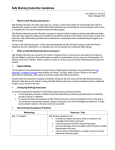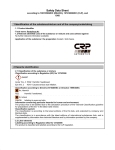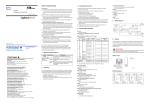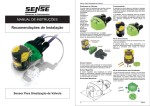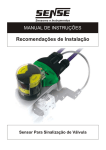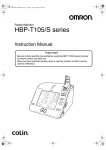Download View the User Manual - Star Electric Vehicles
Transcript
Owner’s Manual and Service Guide Magellan 2 and Magellan 2+2 May 2014 Table of Contents Introduction 2 Vehicle Specifications 3 Operator safety 4 Safety precautions during maintenance Safety considerations Driver Qualifications 5 6 6 6 Golf Course Safety Maintenance required for safety Controls 7 8 8 Switches 9 Pedals 10 Battery indicator 10 Tow switch 11 Serial number Pre-operation check 11 Operation list 11 12 Daily Checklist Operation 12 Storage 13 Maintenance 14 Period maintenance chart Battery care 14 16 18 Battery charging 19 Electrical Diagrams 20 Battery installation 1 Introduction Congratulations on your purchase of a Star EV Magellan. This manual contains information you will need for proper operation, maintenance, and care of your Magellan. A thorough understanding of these simple instructions will help you to obtain maximum enjoyment from your new Star EV. If you have any questions about the operation or maintenance of your Magellan, please consult a Star EV dealer. Read and understand this manual completely before operating your Magellan. This manual should be considered a permanent part of your golf car and should remain with the car when lending or resold. This manual can also be applied to below types. • • Magellan 2: 2 seat golf car Magellan 2+2: 2 seat golf car with 2 add-seats 2 Vehicle Specifications Magellan 2 Magellan 2+2 Passengers 2 4 Motor 6 HP Continuous rating 6 HP Continuous rating Battery group Controller power (amps) Maximum speed (mph) Load capacity (lbs) Dimensions (in) Weight including batteries (lbs) Ground Clearance (in) Turing Radius (ft) Wheelbase (in) Climbing capacity Front suspension Rear suspension Steering system Brake system Tire size Tire pressure (psi) 8 x 6V, Trojan T105 275 Amp AC Curtis 19.5 (20-25 LSV) 650 8 x 6V, Trojan T105 275 Amp AC Curtis 19.5 (20-25 LSV) 650 94 x 47 x 74 115 x 47 x 74 1200 1300 5 5 10 10 68 68 30% Independent A-arm with coil over shocks Leaf spring and shock Rack and pinion 4-wheel hydraulic disc 205 / 50-10 30 30% Independent A-arm with coil over shocks Leaf spring and shock Rack and pinion 4-wheel hydraulic disc 205 / 50-10 30 3 Operator Safety Read and understand this manual completely before operating your golf car. Failure to follow WARNING instructions could result in severe injury or death to the golf car occupants, a bystander, or a person inspecting or repairing the golf car. Particularly important information is distinguished in this manual by the following notations: the safety alert symbols, warnings, cautions, and notes. Please read the following labels carefully before operating your golf car, and promptly replace any labels which become damaged or removed. Star EV golf cars are designed to be simple to operate. However, be sure to observe the following: Read this Owner’s/Operator’s manual and all safety and instruction labels on the golf car before operating. Do not allow more than one occupants per seat. The different vehicles are restricted to different numbers of occupants unless equipped with a rear seat. Do not operate the golf car while under the influence of alcohol or drugs; their affect on vision and judgment makes operating a golf car dangerous. Do not operate the golf car on public streets, roads, or highways unless allowed by law or local regulating authority. Keep your entire body inside the golf car, remain seated, and hold on when the car is in motion. Do not start the golf car until all occupants are seated. Keep your hands on the steering wheel and your eyes on the path ahead. Use extra care in congested areas or when backing up. Always back up slowly, and watch carefully. Avoid starting or stopping abruptly. Vary the speed of the golf car to match the terrain of the course. Avoid turning the steering wheel too sharply at higher speeds. Always drive slowly straight up or straight down slopes and never at an angle. Do not make any modification or addition which affects capacity or safe operation, or make any changes not in accordance with the owner’s operator’s manual. 4 WARNING: Explosive gases are released when batteries are charged or discharged. Keep well ventilated. Keep sparks, flames and cigarettes away from batteries. Shield eyes when working near batteries. Star EV golf cars do not protect passengers from storms. When driving in a rainstorm, passengers should leave the car and take shelter in safe areas. Safety Precautions during Maintenance When performing maintenance, follow all safety instructions contained in the manufacturer’s operation and service manuals, as well as the following safety procedures: Properly immobilize golf car before beginning any maintenance. Properly block chassis before working underneath golf car. Avoid fire hazards, and have appropriate fire protection equipment available. Before working on an electric golf car, disable the car’s electrical system in accordance with the manufacturer’s instructions. (Before disconnecting the batteries, push the button “Tow/Run” to “Tow” side. If not, a battery explosion could occur.) Use only properly insulated tools when working on electrically powered golf cars and around batteries. Maintain all safety devices including brakes, steering mechanisms, and warning devices in a safe operating condition. Do not modify these safety devices as supplied by the manufacturer. After each maintenance or repair, the car must be driven by a qualified, trained, and authorized person – in an area free of pedestrian traffic – to ensure proper operation and adjustment. Record all maintenance performed in a maintenance record log by date, name of person performing maintenance, and type of maintenance. Periodically inspect maintenance log to ensure accurate and complete entries. Provide operator comment cards to assist in identifying non-periodic maintenance needs for specific golf cars. Maintain in a legible condition all nameplates, warnings, and instructions provided by the manufacturer. 5 If new nameplates, warnings, or instructions are needed, contact your Star EV dealer. Safety Considerations Like all machines, golf cars can cause injury if improperly used or maintained. This section contains broad safety practices required for safe golf car operation. Before golf cars are operated, golf course personnel should establish any additional safety practices that may be required for safe operation. The information contained here is intended for golf course personnel responsible for golf car safety. If you are responsible for the operation and maintenance of this golf car, we encourage you to implement this golf car safety program. Driver Qualifications Allow only authorized people to operate golf cars. It is recommended that only people who possess a valid motor vehicle driver’s license be allowed to operate golf cars. Place operation and safety instructions recommended by the golf car manufacturer, along with the golf course safety rules, in a conspicuous place near the golf car rental area or golf car pick-up area. It is also recommended that the following warning be posted in a conspicuous location. Golf Course Safety Perform safety surveys regularly to identify hazardous areas where golf cars should not be operated. The following golf course hazards must be made safe: Steep Grades: Where steep grades exist, restrict golf cars to designated golf car pathways where possible. In addition, identify steep grades with a suitable warning like: WARNING: Steep Grade, Descend Slowly With Foot On Brake Sharp Turns, Blind Corners, Bridge Approaches. 6 Chain or rope off these potentially hazardous areas or identify them with a suitable warning describing the nature of the hazard and the proper precautions to be taken to avoid the hazard. Wet Areas: Wet grass may cause a golf car to lose traction and may affect stability. Reduce speed in wet areas or during periods of inclement weather. Loose Terrain: Loose terrain may cause a golf car to lose traction and may affect stability. Repair loose terrain, chain or rope off these areas, or identify loose terrain with a suitable warning. Golf Car and Pedestrian Interference: Reroute golf car traffic or pedestrian traffic in congested areas wherever possible to prevent accidents. If it is impractical to reroute traffic, erect warning signs to warn pedestrians of golf car traffic, and to warn golf car operators to drive slowly, use caution, and watch for pedestrians. Ventilation: Properly ventilate all maintenance and storage areas in accordance with applicable fire codes and ordinances to avoid fire hazards.Ventilation is required to remove hydrogen gas from the car storage areas during the battery charging process. For electric powered golf cars, the amount of hydrogen gas emitted during charging depends on a number of factors, such as the condition of the batteries, the output rate of the battery charger, and the amount of time the batteries are on charge. Because of the highly volatile nature of hydrogen gas and its propensity to rise and accumulate at the ceiling in pockets, a minimum of five air changes per hour is recommended. Consult applicable fire and safety codes for the specific ventilation levels requirement, as well as requirements for the use of explosion proof electrical apparatus. Maintenance required for Golf Car Safety Preventative Maintenance: Perform all scheduled maintenance in accordance with manufacturer’s recommendations to provide the golfing patron with a safe, properly operating golf car. Personnel: Allow only qualified, trained, and authorized personnel to inspect, adjust, and maintain golf cars. Parts and Materials: Use only replacement parts and materials recommended by the manufacturer. 7 Controls WARNING: If lending or reselling the golf car, make sure the driver is familiar with all the controls and rules. The F/R switch is used to shift the golf car into forward or reverse. In order to avoid occupants’ injury and protect cars, move the switch to the desired position after coming to a complete stop. Press down on the brake pedal to stop the golf car after releasing the accelerator pedal. Your Diablo is equipped with an electromechanical parking brake. It will engage automatically when car is at a complete stop or key switch is in OFF position. Please wait until the car has come to a complete stop before leaving the vehicle. Pay special attention if the car is on a steep hill or the road condition is wet or covered with ice or snow; the parking brake may not be able to completely stop the vehicle. The parking brake will automatically release when the accelerator pedal is depressed. If the main switch is in the ON position, depressing the accelerator may suddenly cause the golf car to move. Main Switch The main switch can be found on the instrument desk below the steering wheel. OFF: Electrical circuit is switched off. The key can be removed only in this position. ON: Electrical circuits are switched on. The golf car can be driven. Drive Select Switch (F/R switch) The F/R switch can be found on the front dashboard next to the key switch. 8 The drive select switch is used to shift the golf car into forward or reverse. After coming to a complete stop, move the lever to the desired position. Switch Position Car Movement F Forward O None R Reverse The back-up buzzer will sound when the drive select switch is turned to reverse. When switched to O position, the car does not move even if the accelerator pedal is depressed. accelerator pedal brake pedal Accelerator Pedal The accelerator pedal can be found on the right side labeled GO. This pedal is different from the accelerator pedal in common car. Turn on the main switch and select the F/R switch to move forward or in reverse and the golf car’s speed will accelerate gradually as the accelerator pedal is depressed. Releasing the pedal causes the power to be cut and the motor to stop working gradually. Brake Pedal The brake pedal is the larger one on the left side labeled STOP. Press down on the brake pedal to stop the golf car. 9 Parking Brake Press down on the brake pedal to stop the golf car after releasing the accelerator pedal. Your Diablo is equipped with an electromechanical parking brake. It will engage automatically when car is at a complete stop or key switch is in OFF position. Please wait until the car has come to a complete stop before leaving the vehicle. Pay special attention if the car is on a steep hill or the road condition is wet or covered with ice or snow; the parking brake may not be able to completely stop the vehicle. The parking brake will automatically release when the accelerator pedal is depressed. If the main switch is in the ON position, depressing the accelerator may suddenly cause the golf car to move. WARNING: The parking brake will automatically release when the accelerator pedal or the brake pedal is depressed. To release the parking brake manually, insert two M4 bolts on the back of the motor as shown. Two M5x45mm bolts and an Allen key are in a plastic bag in the battery compartment. Battery Indicator The battery indicator shows the electric level of the battery. Tow Switch The Tow switch is located in the front of the battery container. The switch can be seen clearly when the seat bottom is being opened by means of pulling the armrest forward. Pulling the switch to TOW (or OFF) will cut the power off and make the car stop. 10 Before towing the car: When the anti-slide function is active, pull the switch to TOW (or OFF to cut off the power for the protection of the electric integrated circuit. Before connecting or disconnecting cables: Pull the switch to TOW (or OFF) to cut off the power and avoid a battery explosion. At least a 10 minute interval should be allowed when changing the switch. Serial Number NOTE: The first three digits of the serial number are for the manufacturing date; the remaining digits are the unit production number. Keep a record of these numbers for reference when ordering parts from your dealer. Pre-Operation Check Every Star EV vehicle has been checked up and adjusted thoroughly. Be familiar with controls, indicators, and operations. Please use the check list as a guide. Pre-operation checks should be made each time you use your golf car. Get in the habit of performing the following checks. WARNING: Be sure the main switch key is removed before performing the pre-operation checks to prevent accidental starting. Pre-Operation Checklist Before each use check the following: Batteries: Check that the batteries are held securely in place to prevent them from being damaged from vibration or jarring. Also check that no battery caps are missing to prevent battery acid from spilling from the batteries. Check the battery terminals for corrosion. 11 Tire condition: Check the tire air pressure before operating the golf car. Check the tire surface for damage, cracks or embedded objects. When tire tread wears down to 0.04” (1 mm), replace the tire. Body and chassis: Before each use, visually inspect the golf car body and chassis for damage and/or missing parts. Daily Checklist Please use the checklist as a guide to check the daily running condition and the car. Drive select switch (F/R switch): Check to make sure the switch works properly. Pedal operation: Check the following pedal controls for proper operation. If a pedal does not work properly, consult a Star EV dealer. Make sure the brake pedal feels firm when pressed and returns to its original position when released. Press down on the brake pedal. The brake pedal should not touch the floor of car. Make sure the parking brake works properly when the electromechanical park brake is engaged. You should not be able to push the vehicle, and the brake should release automatically when the accelerator pedal is pushed. Back-up buzzer: Check the buzzer by moving the drive select switch to REV for reverse. The buzzer should sound. Steering system: Check the steering system for excessive free play by moving the steering wheel up, down, back, and forth, and turning the steering wheel slightly to the right and left. If you feel excessive free play or hear rattling sounds which may indicate loose steering components, consult a Star EV dealer. Sounds: Check for abnormal sounds when running. Operation 1| Learn the controls of the vehicle. 2| Make sure every occupatant remains seated. 12 3| Read the warnings on the indicator board. 4| Make sure the steering wheel works well. 5| Turn the main switch to ON. Check that your path is clear. 6| Turn the drive select switch to FWD for forward, or REV for reverse. 7| Slowly depress the accelerator pedal, and the locked parking brake will automatically release. The golf car will start to move. The speed increases gradually as the accelerator pedal is depressed. WARNING: Control the speed when descending a slope. The brake can control the speed when descending a slope. CAUTION: Pressing the F/R switch to the O position cuts off the power and the car stops. Stopping 1| To stop the golf car, gradually press down on the brake pedal. 2| When the car has come to a stop, the parking brake will automatically engage. You should hear a click sound. 3| Turn the main switch to OFF. Switch the F/R switch to the O position, and take out the key when not in use. Storage Perform the following preparations when storing your golf car for extended periods of time: 1| Turn main switch key to OFF position, remove key, and store key in a safe place. 2| Verify the tire pressure is set to 35 psi. 3| Clean the exterior of the golf car. 13 4| Cover the golf car with a breathable cover and store it in a dry, well-ventilated area. 5| Have the batteries recharged every 60-90 days to keep them fully charged. The batteries must be kept fully charged to avoid damage. 6| Have the car lubricated every 6 months. 7| Clean the top of the batteries with a solution of baking soda and water, as necessary, to remove corrosion. 8| Trap the wheels to avoid the car moving. Maintenance Periodic Maintenance Chart Regular maintenance is required for the best performance and safe operation of your golf car. Be sure the main switch is off and the parking brake is engaged when you perform maintenance unless otherwise specified. If the owner is not familiar with machine servicing, this work should be done by a Star EV dealer or other qualified mechanics. C: Check CA: Check and adjust R: Replace Charge Clean battery tops, check for tightness of screws and terminals Check brake pedal free-play and adjust if necessary Check steering operation S: Service CL: Clean and lubricate L: Lubricate daily/ pre-op monthly six months yearly four years S S S S S S S S S S C CA CA CA CA C 14 C C C C Check tire pressure, tread depth, and tire surface for damage Check body and chassis for damage Check tightness of all bolts, nuts, screws, and rivets Check reverse buzzer Check electrolyte level C CA CA CA CA C C C C C C C C C C C C C Check for loose or broken connections Clean and lube pedal control area Check all wire insulation for cracks and/or worn spots Check shock absorbers for oil leaks and damaged springs C CL Perform a discharge test Apply terminal protectant C C C C C 15 C C CL CL C C C S S C C CA CA C C CA CA C C C Replace transaxle oil C CL S Check rear axle bearing play for roughness or free play Check steering knuckle bushing free play / Adjust wheel alignment Check wheel nut tightness, front wheel bearing play Check transaxle oil level and inspect for leakage Check pedal stop operation and adjust if necessary Inspect internal wet brake and replace pads if necessary C C S C R CA Battery Care WARNING: Battery electrolyte is poisonous, dangerous, and can cause severe burns. It contains sulfuric acid. Avoid contact with skin, eyes, or clothing. Antidotes: • • • External: Flush with water. Internal: Call a physician immediately. Drink large quantities of water or milk. Eyes: Flush with water for 15 minutes and get prompt medical attention. Batteries produce explosive gases. Keep sparks, flames, and cigarettes away from battery. Ventilate when charging or using in an enclosed space. Always shield eyes when working near batteries. WARNING: Keep out of reach of children. Eight 6-volt deep cycle batteries provide power for your electric golf car and must be properly maintained and recharged for maximum performance and service life. To maintain your batteries: 1| Clean the tops of the batteries with a solution of baking soda and water, as necessary, to remove corrosion. CAUTION: Do not allow cleaning solution to enter battery cells. 2| Check the fluid level before and after charging. Before charging: Only add distilled water if fluid is below the top of the plates, and then add just enough to cover plates. After charging: Add distilled water carefully until the water level is ¼ to ½ inches up to the plate or at the ¼ and 3/8 position in the level indicator. Adding properly distilled water can help to prevent the water from boiling after charging. 16 min. level of electrolyte vent cap max. level of electrolyte plates CAUTION: Normal tap water contains minerals which are harmful to a battery; therefore, refill only with distilled water. 3| Using a hydrometer, check the specific gravity of the battery fluid in each cell against the readings on the chart below. Consult a Star EV dealer if any low readings are found, or if readings vary more than one point between cells. Temperature ˚F ˚C Satisfactory Uncorrected Hydrometer Reading 120 48.9 1.244 100 37.8 1.252 110 90 80 70 60 50 40 30 43.3 1.248 32.2 1.256 26.7 1.260 21.1 1.264 15.6 1.268 10.0 1.272 4.4 1.276 -1.1 1.280 17 Battery Charging WARNING: Read and understand the owner’s manual provided with your golf car’s battery charger before charging batteries. WARNING: Explosive hydrogen gas is produced while batteries are being charged. Only charge batteries in well ventilated areas (a minimum of five air changes per hour is recommended). To charge the batteries in your golf car, follow the instructions contained in your battery charger’s owner’s manual. The following is a summary of the charging steps. WARNING: Do not attempt to recharge your golf car’s batteries without thoroughly reading and understanding the owner’s manual provided with your charger. 1| Turn main switch key to “OFF” position. 2| With the charger properly connected and grounded (see charger’s owner’s manual), insert the DC output plug into the golf car receptacle. Do not connect the AC with the golf car directly. charging socket charging plug CAUTION: Use only battery chargers that are rated for use with 48-volt Star EV Golf Cars. Thoroughly read and understand the user manual supplied with your 48-volt charger. WARNING: Do not disconnect the DC output cord from the battery receptacle when the charger is on or an arc could occur that may cause an explosion. 3| The charger will turn off automatically when the batteries reach full charge. 18 4| After the charger has turned off, disconnect the DC output plug from the golf car receptacle by grasping the plug body and pulling the plug straight out of the receptacle. Battery Installation WARNING: When working with batteries, do not put wrenches or other metal objects across the battery terminals. This can cause explosion of the battery. Install the battery tie down plates and torque to as shown. left (driver’s side) front WARNING: When installing batteries, carefully place battery cables and tie-downs making sure that cables do not lay across vent caps. Always remove the negative (–) cable to the motor controller first, and install it last. CAUTION: Do not over-tighten the battery tie-down nuts. Excessive force will damage the battery casing. 19 20 21























